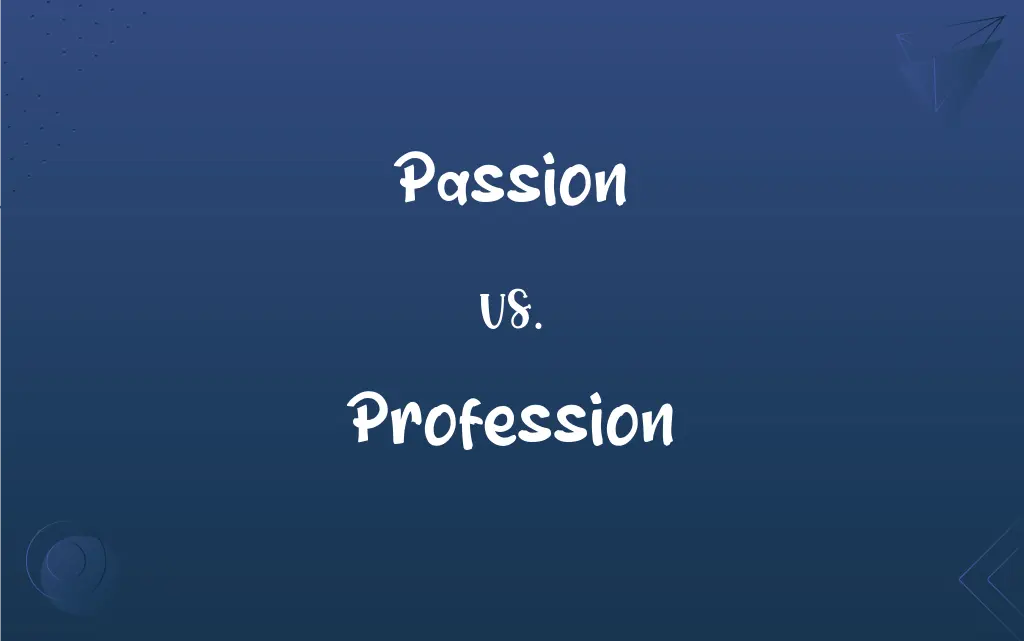Passion vs. Profession: What's the Difference?
Edited by Janet White || By Harlon Moss || Published on December 9, 2023
Passion is a strong inclination towards an activity or subject for personal enjoyment or fulfillment, whereas profession refers to a career or occupation pursued for monetary gain or social status.

Key Differences
Passion is an intense enthusiasm or love for a particular activity, subject, or hobby, often driven by personal interest and intrinsic motivation. In contrast, a profession is an occupation or career, typically requiring specialized training or education, and chosen for earning a livelihood.
A person's passion can be unrelated to their professional career and might not provide financial sustenance, focusing instead on personal satisfaction and fulfillment. Conversely, a profession, while it can align with personal interests, primarily serves as a means of earning income and sustaining livelihood.
Passions are often pursued in one's leisure time and can include a wide range of activities from arts to sports, often contributing to personal identity and happiness. A profession, however, is structured around skill sets, job responsibilities, and societal roles, contributing to one's professional identity and societal status.
The pursuit of passion often allows for creative freedom and self-expression without the constraints of external requirements or monetary objectives. On the other hand, a profession typically involves adhering to industry standards, organizational rules, and societal expectations, often with financial and career progression goals.
Passion can sometimes turn into a profession if the individual decides to pursue their interest as a career, it is not always feasible or desirable. In contrast, a profession may become a passion if the individual develops a deep love and enthusiasm for their work over time.
ADVERTISEMENT
Comparison Chart
Primary Motivation
Personal enjoyment and fulfillment
Monetary gain and career advancement
Relation to Income
Not primarily income-generating
Source of livelihood
Pursuit Context
Often pursued in leisure time
Pursued as a career or job
Training and Skills
May or may not involve formal training
Often requires specialized training or education
Role in Life
Contributes to personal identity and joy
Contributes to professional identity and societal status
ADVERTISEMENT
Passion and Profession Definitions
Passion
Passion often drives individuals to pursue activities for personal satisfaction.
Cooking has always been his passion, leading him to experiment with new recipes.
Profession
Profession encompasses the body of people in a learned occupation.
The legal profession is known for its strict ethical codes.
Passion
Passion involves emotional investment and a strong connection to an activity or subject.
His passion for music is evident in every performance.
Profession
Profession often refers to a career or job chosen for financial stability and growth.
She chose teaching as her profession and finds it rewarding.
Passion
Passion is an intense desire or enthusiasm for something.
Her passion for painting inspires everyone around her.
Profession
Profession is a paid occupation, particularly one that involves prolonged training and formal qualifications.
Medicine is a highly respected profession.
Passion
Passion can be a hobby or interest that deeply engages and motivates a person.
She has a passion for environmental activism, participating in various campaigns.
Profession
Profession involves a commitment to specific duties, responsibilities, and standards.
His profession as an engineer requires meticulous attention to detail.
Passion
Passion is a driving force that can lead to self-fulfillment and personal happiness.
Pursuing her passion for writing, she authored several books.
Profession
Profession can contribute to an individual's identity and societal role.
Journalism as a profession plays a crucial role in keeping the public informed.
Passion
Strong or powerful emotion
A crime of passion.
Profession
An occupation or career
"One of the highest compliments a child can pay a parent is to choose his or her profession" (Joan Nathan).
Profession
An occupation, such as law, medicine, or engineering, that requires considerable training and specialized study.
FAQs
Can a passion become a profession?
Yes, if one turns their interest into a career.
Are passions typically income-generating?
Generally, no; they're pursued for personal fulfillment.
What is a profession?
A paid occupation, often requiring specialized training.
Does a profession always align with one's passion?
Not always; many choose professions for financial reasons.
Can professional success lead to passion in a job?
Yes, success can cultivate a love for one's work.
What is passion?
Intense love or enthusiasm for an activity or subject.
Do passions require professional training?
Not necessarily; they're often self-driven pursuits.
Is it common for people to pursue their passion as a hobby?
Yes, many engage in passions outside their profession.
How does one discover their passion?
Through exploration, experience, and self-reflection.
What is the main motivation for pursuing a profession?
Financial stability and career growth.
Can a person have multiple passions?
Yes, it's common to have varied interests.
Is formal education necessary for a profession?
Often, yes, especially in specialized fields.
How do societal expectations influence profession choice?
They can significantly impact career decisions.
How does one choose a profession?
Based on interests, skills, and market opportunities.
Is it feasible to switch professions to follow a passion?
It's possible, though it may require additional training or education.
What role does passion play in personal happiness?
It's key to personal fulfillment and joy.
Are professions limited to traditional careers?
No, they can include a wide range of fields.
Can financial needs override passion in career choice?
Yes, practical considerations often take precedence.
Do professions evolve over time?
Yes, with changing industries and personal growth.
Can passion influence professional development?
Definitely, as it can drive continued learning and enthusiasm.
About Author
Written by
Harlon MossHarlon is a seasoned quality moderator and accomplished content writer for Difference Wiki. An alumnus of the prestigious University of California, he earned his degree in Computer Science. Leveraging his academic background, Harlon brings a meticulous and informed perspective to his work, ensuring content accuracy and excellence.
Edited by
Janet WhiteJanet White has been an esteemed writer and blogger for Difference Wiki. Holding a Master's degree in Science and Medical Journalism from the prestigious Boston University, she has consistently demonstrated her expertise and passion for her field. When she's not immersed in her work, Janet relishes her time exercising, delving into a good book, and cherishing moments with friends and family.







































































